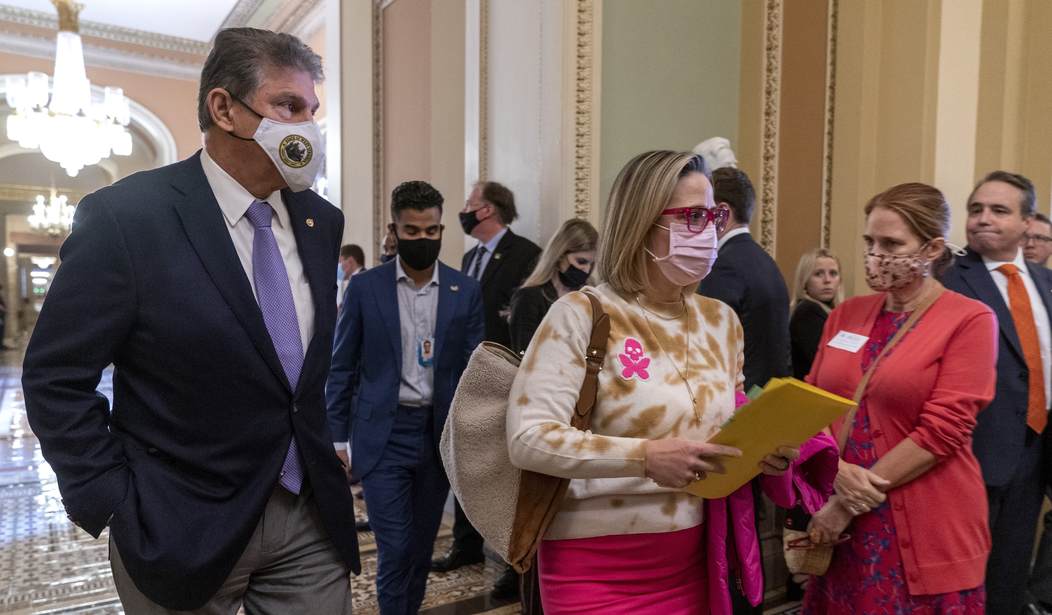Does this sound like Joe Manchin trying to convince Kyrsten Sinema … or himself? Perhaps it’s a bit of both (although the “believe” comes from Politico’s report), because Sinema won’t be the only one taking this reconciliation deal on faith. Manchin’s message to the suddenly taciturn Arizona Democrat on Fox News Sunday put the reconciliation agreement into the realm of religious tenets, perhaps appropriate for its Green New Deal components:
And Manchin had plenty of work to do during his quintet of appearances, with hosts pressing him whether the bill really fights inflation and how imposing a new minimum tax on large corporations might affect the economy. Faced with those questions, Manchin said simply on “Fox News Sunday”: “We did not raise taxes. We closed loopholes.”
He also made sure to credit Sinema with cajoling Democrats into that tax-skeptic position after many in her party weighed surtaxes on high earners and pushed for rate increases. Though Sinema’s stayed quiet since Manchin and Schumer announced the deal on Wednesday, Manchin said that he “would like to think she’d be favorable to it.”
“Kyrsten Sinema is a friend of mine, and we work very close together. She has a tremendous, tremendous input in this legislation,” Manchin said on NBC’s “Meet the Press.” “She basically insisted [on] no tax increases, [we’ve] done that. And she was very, very adamant about that, I agree with her. She was also very instrumental” on prescription drug reform.
No tax increases, eh? That’s not how the Wall Street Journal sees it. Not only will the change on carried interest hike taxes on investors, it will actually hit a wide swath of Americans, while doing nothing on inflation for at least a full year. And its deficit reduction potential will take four more years than that to have any effect:
Start with the authors’ central claim that the bill will reduce the deficit and thus inflation. The Penn Wharton Budget Model, which Sen. Manchin has been known to watch, examined the details of Schumer-Manchin and found that it doesn’t contain any net deficit reduction until 2027.
“The impact on inflation is statistically indistinguishable from zero” through 2031, say the Penn Wharton modelers. We don’t agree with those who think deficit reduction leads in a straight line to lower inflation, but that’s what the Democrats claim for their bill. If the first deficit reduction doesn’t come for five years, what’s the help on inflation today? …
No surprise, that’s exactly what the Joint Committee on Taxation found in its analysis of the Schumer-Manchin bill’s distributional impact. The JCT finds that average tax rates will increase for nearly every income category in 2023 under the bill.
Taxes will rise by $16.7 billion in 2023 on Americans earning less than $200,000 a year. Taxpayers earning between $200,000 and $500,000 will pay $14.1 billion more. This gives the lie to Democratic claims that no one earning under $400,000 will pay more taxes under the bill, a promise Mr. Biden also made in his campaign. The reality is that the Schumer-Manchin bill is a tax increase on nearly every American.
Small wonder you gotta believe. If you rely on the facts, you’ll see right through it.
Speaking of which, what about those efforts to expand American oil and gas production? You gotta believe in those too, Politico reports, because that’s not actually part of the reconciliation bill:
The West Virginia Democrat also answered several questions about the second part of a deal: an agreement with Biden, Schumer and Speaker Nancy Pelosi to increase energy production by implementing federal permitting reform. That piece was excluded from the party-line bill because it is likely to run afoul of the strict budget rules on reconciliation bills.
Asked how he can be so sure that will pass later, Manchin offered a warning on Fox News if it doesn’t happen: “There will be consequences.”
Manchin’s taking a lot on faith, and asking Sinema to take even more on belief rather than ironclad agreement. What “consequences” will Manchin impose if Biden, Pelosi, and Schumer renege on this pledge? To change parties? Manchin would have gotten his best deal on that threat before last week, likely keeping his committee chair position. After this and likely even more so after the midterms, Manchin’s value to the GOP has dropped considerably.
Manchin’s selling smoke and mirrors. Will Sinema see through it? She probably already does, but I’d still bet that she votes to approve this reconciliation package. I still gotta believe that she believes that she’ll get the political tar-and-feathers treatment again by her party if she tanks this deal, as bad as it clearly is. The best hope for defeating this is that the Senate parliamentarian forces out a provision that creates a Jenga-like collapse to the Schumer-Manchin agreement, and that takes a pretty large amount of faith in Elizabeth MacDonough. In that sense of religious belief, count me as entirely agnostic.








Join the conversation as a VIP Member